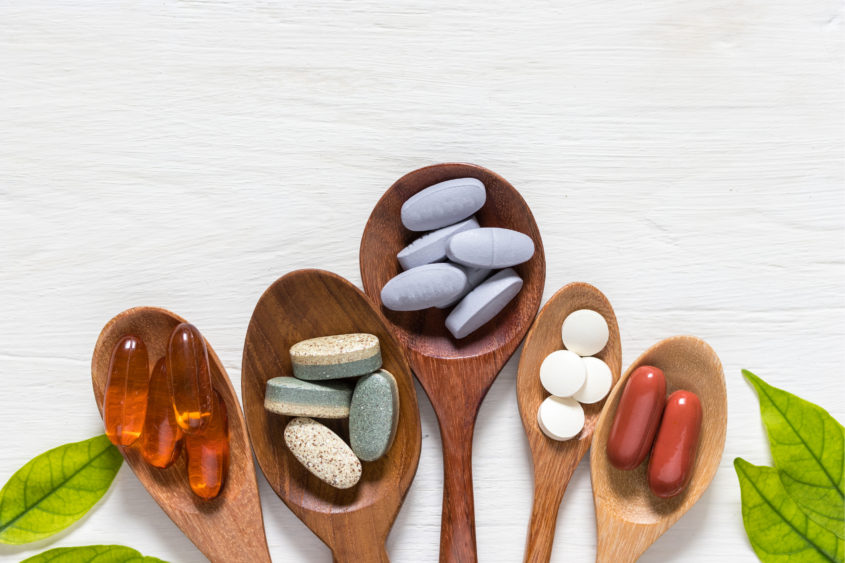9 Essential Nutrients for Health & Beauty

*** The following information is not intended to replace the advisement of your healthcare provider. Please consult your primary care physician if you have questions regarding your daily vitamin & supplement intake. ***
If it seems like you’ve been seeing vitamins everywhere lately, it’s likely because you have. The consumption of vitamins, minerals, and dietary supplements is at an all-time high in the U.S., as many Americans are choosing to eat and be healthier. And what could be more essential to our health than nutrition, the primary source of essential vitamins and minerals? For centuries, we’ve depended on these nutrients for our body’s survival and fitness, and protection from various diseases.
And though vitamins and minerals are necessary, all dietary supplements are not. So how do we separate the fundamental from the fluff and decide if we need that $45 bottle of Kava Root (Hint: you don’t). Daily vitamin requirements are a good place to start. But if you’re a female looking to incorporate vitamins into your daily regimen for health and beauty, we’ve got you covered! Keep reading for 9 of the best dietary supplements to include in your day-to-day diet.
#1) Biotin
Also known as Vitamin B7, biotin is essential for healthy bones and hair, and it also plays a vital role in breaking down fats, carbohydrates, and proteins in food. Though biotin deficiency is rare, inadequate biotin intake can cause hair loss, brittle nails, and skin problems. The recommended daily biotin intake for women ages 19 and up is 30 mcg. Biotin is available for purchase in various formulations and can be found in eggs, fish, meat, nuts, and sweet potatoes.
#2) Calcium
Calcium intake is critical for strong bones and teeth, especially since women start to lose bone density in their twenties. Calcium is also needed for blood and muscle movement throughout the body, though many people in the U.S. – including African-Americans and Asians – get less than the recommended daily amount. So how much calcium should we be getting? For adults ages 19-50 years old, 1000mg daily does the trick. Calcium can be found in milk, yogurt, and cheese. But for those with dairy sensitivities, dark-green leafy vegetables, salmon, and calcium supplementation are options.
#3) Iron
A mineral of many talents, iron transports oxygen in the body, supports muscle metabolism and neurological development and is essential for cellular functioning. Low iron can cause iron-deficiency anemia (decreased red blood cells), fatigue, shortness of breath, and decreased immune function. Iron is especially important in pregnancy as it is necessary for infant brain development. The recommended daily amount of iron intake for adult women ages 19-50 is 18mg and 27mg in pregnancy. Lean meats, seafood, poultry, nuts, beans, and dark-green leafy vegetables are all rich in iron and can more easily be absorbed within the body with Vitamin C.
#4) Omega-3 Fatty Acids
There are three primary fatty acids – with names too long to type but commonly abbreviated as ALA, DHA, and EPA – that assist in brain operation and behavioral function, help reduce high blood pressure, and calm inflammation. They may also help lower the risk of heart disease, cancer, and arthritis. Though Omega-3 deficiency is rare, it can cause scaly skin and an itchy rash. Though experts have not yet established recommended daily amounts for all Omega-3 fatty acids, the suggested daily dose of ALA is 1.1 grams. Omega-3s can be found naturally in fish, seafood, nuts, seeds, plant oils, and fish oil capsules.
#5) Vitamin A
It seems Vitamin A’s job is never done as it ensures proper eye function, prevents sun damage to the skin, and helps the heart, lung, and other organs function properly. Most people in the U.S. get enough Vitamin A from the foods they eat, but a deficiency could lead to anemia, blindness, infection, and in severe cases, death. The recommended daily amount of Vitamin A in adult females is 700 mcg. Vitamin A can be found in – you guessed it – leafy green vegetables and salmon, eggs, fruits, dairy products, and other green, orange, and yellow vegetables.
#6) Vitamins B6 & B12
The BEST of the Bs, pyridoxine (B6) and cyanocobalamin (B12), are B Vitamins essential for the breakdown of proteins, carbohydrates, and fats and the formation of red blood cells and DNA, respectively. B Vitamin deficiencies can cause anemia, tiredness, depression, hair loss, congenital disabilities, and more. Adults ages 19 – 50 should get 1.3mg of pyridoxine daily through poultry, fish, potato, and fruit consumption or B6 supplementation. Cyanocobalamin can be found in fish, meat, chicken, egg, milk, and dairy products, and the recommended daily intake for adults is 2.4mg.
#7) Vitamin C
And the C is for collagen! Because ascorbic acid (Vitamin C) is needed to make collagen and hold the protein together. It also helps improve iron absorption and block free radical damage. Vitamin C deficiency can cause gingivitis, nosebleeds, and a decreased ability to fight infections. Adult women should take 75mg daily through citrus fruit and vegetable consumption. Vitamin C is also available as a dietary supplement.
#8) Vitamin D
For good bone health and immune system support, you need Vitamin D. Without it, bones can become thin, brittle, and weak. Your body makes Vitamin D when your bare skin is exposed to the sun, but it can also be found in dietary supplements. Adults ages 19-70 need 15 mcg daily. Foods that provide vitamin D include fatty fish, fish liver oils, and fortified foods like milk and breakfast cereals.
#9) Vitamin E
An essential beauty nutrient, Vitamin E is an anti-inflammatory useful for treating acne, promoting healthy cell turnover, and preventing skin aging. Though the diet of most Americans does not provide the recommended amount of Vitamin E, in healthy people, Vitamin E deficiency is rare. The recommended daily amount of Vitamin E is 15mg daily, though many vitamin E-only supplements commonly contain more. Vitamin E can be found in nuts, seeds, and green vegetables like spinach and broccoli.
Honorable Mention: Collagen
The health and beauty industry’s collagen obsession is fairly new, but according to the experts, collagen’s benefits know no bounds. As the most abundant protein in the body, collagen provides skin structure and bone strengthening while reducing skin wrinkles and dryness. It’s also helpful in relieving symptoms of osteoarthritis and joint pain. A 2.5 – 15 gram daily dose of collagen appears safe and effective, though no federally recommended daily amount of collage exists. Foods rich in collagen include fish, chicken, egg whites, citrus fruits, and leafy greens. Collagen supplementation is available also.
What dietary supplement do you swear by? Let us know in the comments below! Love & Hugs.





Rachel
Biotin, Vitamin E & Omega-3’s for me!
Dominique
I take vitamins C, D, b12 currently. I’ve heard ppl say they broke out from taking biotin so I’ve never added that in, but I’m curious. Definitely need to add iron and calcium in there as well.